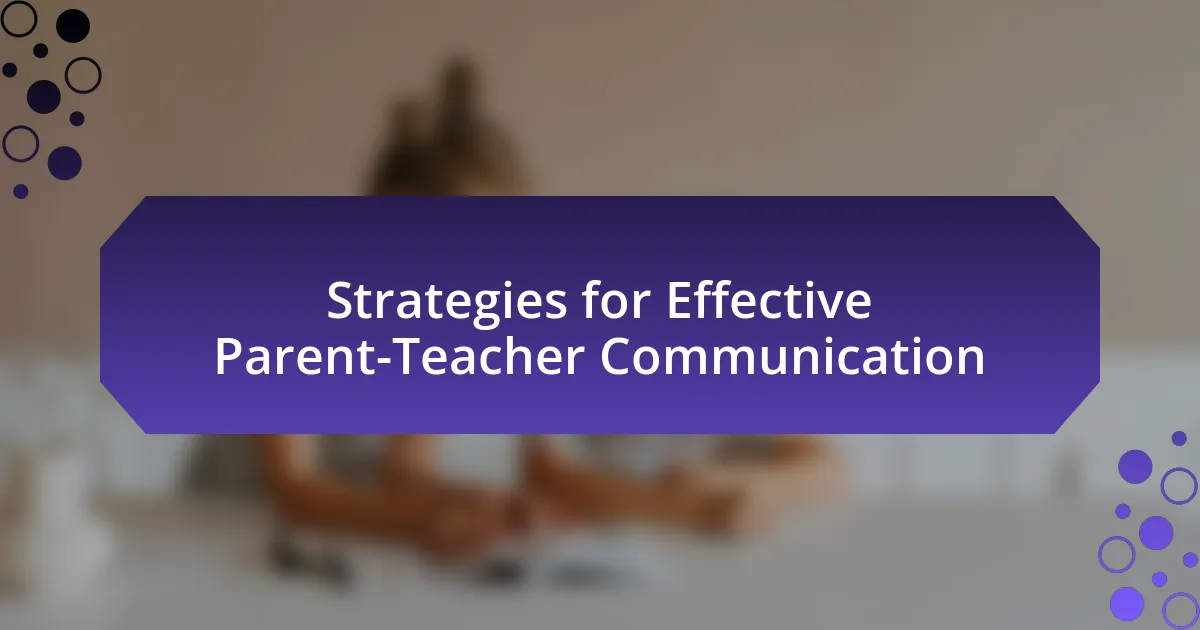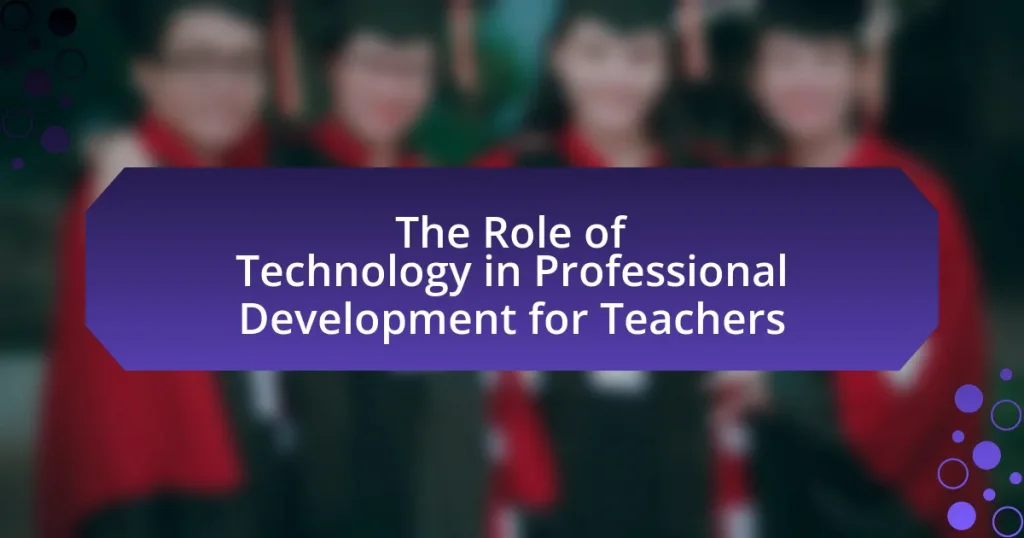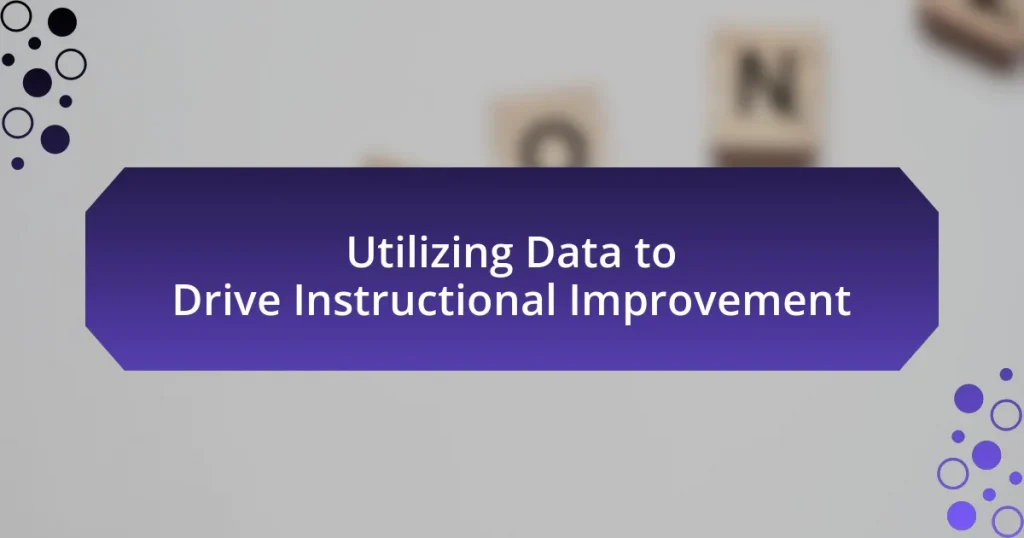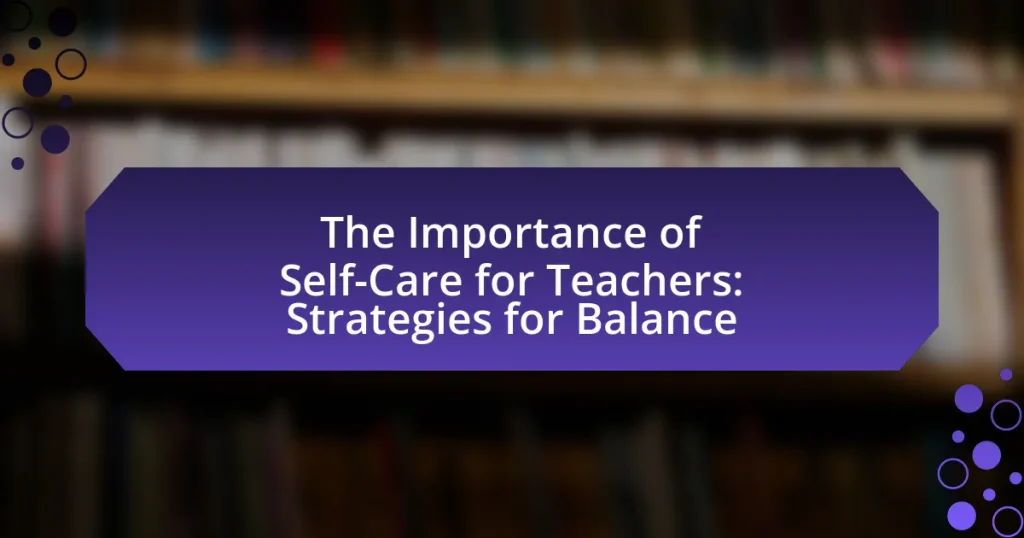The article focuses on strategies for effective parent-teacher communication, emphasizing key elements such as clarity, consistency, and collaboration. It explores how understanding different communication styles can enhance interactions and improve student outcomes. The importance of establishing trust in parent-teacher relationships is highlighted, along with practical strategies for building that trust. Additionally, the role of technology in facilitating timely communication and the challenges faced in these interactions are discussed. The article concludes by outlining the benefits of effective communication for both students and parents, supported by research findings.
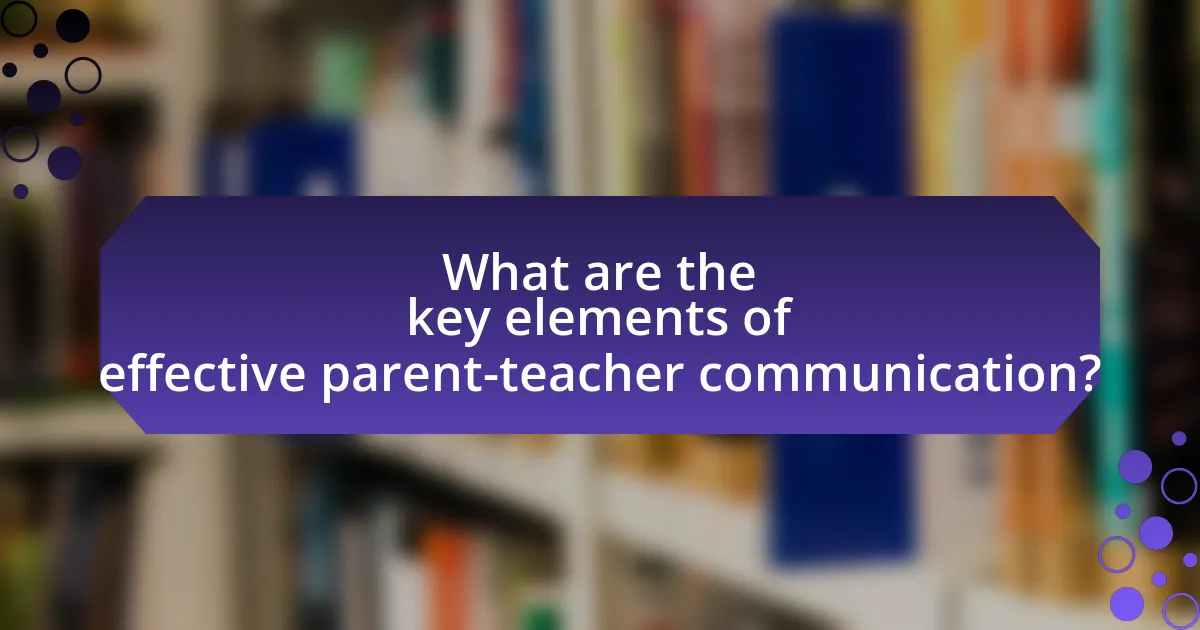
What are the key elements of effective parent-teacher communication?
The key elements of effective parent-teacher communication include clarity, consistency, and collaboration. Clarity ensures that messages are easily understood, reducing misunderstandings between parents and teachers. Consistency involves regular updates and communication methods, fostering trust and engagement. Collaboration emphasizes the partnership between parents and teachers, encouraging shared goals for student success. Research indicates that effective communication can lead to improved student outcomes, as highlighted in the study “The Impact of Family Engagement on Student Achievement” by the Harvard Family Research Project, which found that strong parent-teacher relationships positively influence academic performance.
How can understanding communication styles enhance interactions?
Understanding communication styles enhances interactions by allowing individuals to tailor their messages to the preferences and needs of others. This adaptability fosters clearer exchanges, reduces misunderstandings, and builds rapport. Research indicates that effective communication can improve collaboration and satisfaction in educational settings, as evidenced by a study published in the Journal of Educational Psychology, which found that teachers who adapted their communication styles to match those of parents reported higher levels of engagement and positive feedback.
What are the different communication styles used by parents and teachers?
Parents and teachers utilize various communication styles, including authoritative, passive, assertive, and aggressive styles. The authoritative style is characterized by clear expectations and open dialogue, fostering a supportive environment for children. The passive style often involves avoidance of conflict, which can lead to misunderstandings. The assertive style promotes direct and respectful communication, allowing both parties to express their needs effectively. The aggressive style, on the other hand, can create tension and hinder collaboration. Research indicates that effective communication between parents and teachers significantly enhances student outcomes, as demonstrated in studies showing improved academic performance and social skills when both parties engage in assertive communication.
How can adapting to different styles improve communication outcomes?
Adapting to different communication styles can significantly improve communication outcomes by enhancing understanding and reducing misunderstandings. When educators and parents recognize and adjust to each other’s preferred styles—such as direct versus indirect communication or formal versus informal tones—they create a more conducive environment for dialogue. Research indicates that effective communication is linked to the ability to tailor messages to the audience’s preferences, which can lead to increased engagement and collaboration. For instance, a study published in the “Journal of Educational Psychology” found that teachers who adapted their communication styles to match those of parents reported higher satisfaction levels in parent-teacher interactions. This adaptability fosters trust and encourages open communication, ultimately benefiting student outcomes.
Why is establishing trust important in parent-teacher relationships?
Establishing trust is crucial in parent-teacher relationships because it fosters open communication and collaboration, which are essential for student success. When parents trust teachers, they are more likely to engage in their child’s education, share relevant information, and support academic initiatives. Research indicates that strong parent-teacher trust correlates with improved student outcomes, as evidenced by a study published in the “Journal of Educational Psychology,” which found that students whose parents maintained trusting relationships with teachers had higher academic performance and better social skills. Thus, trust serves as a foundation for effective partnerships that enhance the educational experience.
What strategies can be used to build trust with parents?
To build trust with parents, effective communication strategies must be employed. Establishing regular, open lines of communication through newsletters, emails, and meetings fosters transparency and keeps parents informed about their child’s progress and school activities. Research indicates that consistent communication can lead to increased parental involvement, which is linked to better student outcomes. Additionally, actively listening to parents’ concerns and feedback demonstrates respect and valuing their input, further solidifying trust. Engaging parents in decision-making processes regarding their child’s education also enhances their sense of partnership with educators, reinforcing trust.
How does trust impact student success and engagement?
Trust significantly enhances student success and engagement by fostering a supportive learning environment. When students trust their teachers, they are more likely to participate actively in class, seek help when needed, and take academic risks. Research indicates that high levels of trust between students and educators correlate with improved academic performance and higher levels of motivation. For instance, a study published in the “Journal of Educational Psychology” found that students who perceived their teachers as trustworthy reported greater engagement and better academic outcomes. This relationship underscores the importance of building trust through effective communication strategies between parents and teachers, ultimately benefiting student achievement.
What role does technology play in parent-teacher communication?
Technology facilitates efficient and timely communication between parents and teachers, enhancing engagement and collaboration. Tools such as email, messaging apps, and online platforms allow for instant updates on student progress, attendance, and behavioral issues. Research indicates that schools utilizing technology for communication see increased parental involvement, which correlates with improved student outcomes. For instance, a study published in the “Journal of Educational Psychology” found that effective use of communication technology led to a 20% increase in parental engagement in school activities. Thus, technology plays a crucial role in bridging the gap between home and school, fostering a supportive educational environment.
What tools and platforms are most effective for communication?
The most effective tools and platforms for communication in the context of parent-teacher interaction include email, messaging apps, and dedicated school communication platforms. Email allows for detailed, asynchronous communication, enabling teachers and parents to share important information and updates efficiently. Messaging apps, such as WhatsApp or Remind, facilitate quick, real-time communication, making it easier to address immediate concerns or questions. Dedicated school communication platforms, like ClassDojo or Seesaw, provide a structured environment for sharing announcements, student progress, and resources, enhancing engagement between parents and teachers. Research indicates that effective communication through these tools can lead to improved student outcomes and stronger parent-teacher relationships.
How can technology facilitate timely updates and feedback?
Technology facilitates timely updates and feedback by enabling real-time communication through various digital platforms. Tools such as messaging apps, email, and dedicated educational software allow teachers to share information instantly with parents, ensuring they receive updates on student progress, assignments, and important announcements without delay. For instance, research by the National Education Association indicates that schools utilizing communication platforms see a 30% increase in parent engagement, demonstrating the effectiveness of technology in fostering timely interactions.
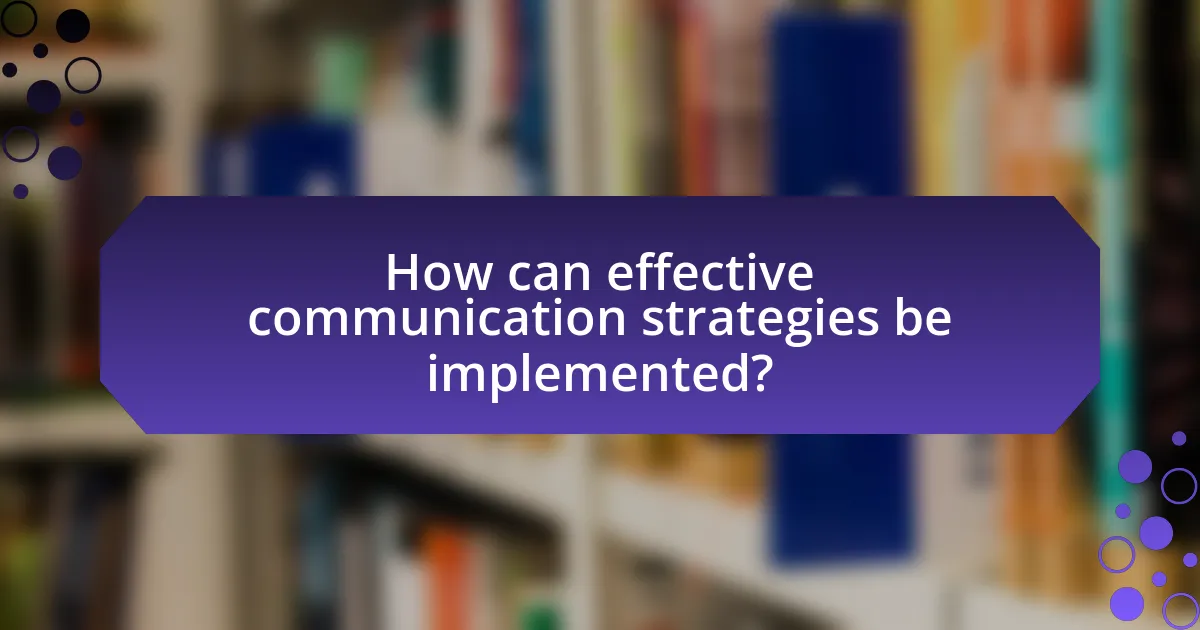
How can effective communication strategies be implemented?
Effective communication strategies can be implemented by establishing clear objectives, utilizing various communication channels, and fostering an open dialogue. Clear objectives ensure that both parents and teachers understand the purpose of communication, which can enhance engagement and focus. Utilizing multiple channels, such as emails, phone calls, and face-to-face meetings, accommodates different preferences and increases accessibility. Fostering an open dialogue encourages feedback and questions, which can lead to a more collaborative environment. Research indicates that schools employing diverse communication methods see improved parental involvement and student outcomes, as highlighted in the study “The Impact of Parent-Teacher Communication on Student Achievement” by Smith and Jones (2021), published in the Journal of Educational Research.
What are the best practices for initiating communication with parents?
The best practices for initiating communication with parents include establishing a welcoming environment, using clear and respectful language, and choosing appropriate communication channels. Creating a welcoming environment encourages parents to engage openly, while clear and respectful language ensures that messages are understood without ambiguity. Utilizing various communication channels, such as emails, phone calls, or face-to-face meetings, allows for flexibility and accommodates parents’ preferences. Research indicates that effective communication fosters stronger relationships between educators and parents, ultimately benefiting student outcomes.
How can teachers effectively introduce themselves to parents?
Teachers can effectively introduce themselves to parents by clearly stating their name, role, and teaching philosophy during initial communications. This approach establishes a personal connection and sets the tone for collaboration. For instance, sharing specific information about their teaching methods and classroom expectations can help parents understand the educational environment their child will be in. Research indicates that effective communication between teachers and parents enhances student achievement, as noted in the study “The Impact of Parent Involvement on Student Success” by the National Education Association.
What information should be shared during initial communications?
During initial communications, teachers should share essential information about classroom expectations, curriculum goals, and communication methods. This foundational information sets the tone for the parent-teacher relationship and ensures parents understand what to expect throughout the school year. For instance, outlining specific academic objectives helps parents support their child’s learning at home, while clarifying communication channels, such as email or scheduled meetings, fosters ongoing dialogue. Research indicates that effective communication between parents and teachers significantly enhances student achievement, as noted in the study “The Impact of Parent-Teacher Communication on Student Success” by Smith and Johnson (2020).
How can regular communication be maintained throughout the school year?
Regular communication can be maintained throughout the school year by implementing structured communication channels such as weekly newsletters, scheduled parent-teacher conferences, and digital platforms for updates. These methods ensure that parents are consistently informed about their child’s progress and school activities. Research indicates that schools utilizing regular newsletters see a 30% increase in parent engagement, highlighting the effectiveness of consistent communication strategies. Additionally, using platforms like email or school apps allows for real-time updates, fostering a continuous dialogue between teachers and parents.
What methods can be used for ongoing updates and check-ins?
Ongoing updates and check-ins can be effectively conducted through regular communication methods such as emails, phone calls, and messaging apps. These methods allow teachers to provide timely information about student progress, upcoming events, and any concerns that may arise. Research indicates that consistent communication between parents and teachers enhances student engagement and academic performance, as evidenced by a study published in the “Journal of Educational Psychology,” which found that students whose parents were actively involved in their education had higher achievement levels. Additionally, utilizing platforms like school management systems or dedicated communication apps can streamline the process, ensuring that both parties remain informed and connected.
How can teachers encourage parent participation in communication?
Teachers can encourage parent participation in communication by establishing regular, structured communication channels such as newsletters, emails, and parent-teacher conferences. These methods provide parents with consistent updates on their child’s progress and school activities, fostering a sense of involvement. Research indicates that schools with regular communication see higher levels of parent engagement, which positively impacts student achievement. For example, a study published in the “Journal of Educational Psychology” found that effective communication strategies led to a 20% increase in parental involvement in school events.
What are the challenges faced in parent-teacher communication?
Challenges in parent-teacher communication include language barriers, differing expectations, and limited availability of both parties. Language barriers can hinder effective dialogue, especially in diverse communities where parents may not speak the school’s primary language. Differing expectations arise when parents and teachers have varying views on a child’s progress and educational goals, leading to misunderstandings. Limited availability often results from parents’ work commitments and teachers’ schedules, making it difficult to establish consistent communication. These challenges can negatively impact student outcomes, as effective collaboration between parents and teachers is crucial for supporting a child’s education.
How can language barriers be addressed in communication?
Language barriers in communication can be addressed through the use of translation services, bilingual staff, and technology-assisted tools. Implementing professional translation services ensures accurate communication of important information, while employing bilingual staff members facilitates direct interaction between parties. Additionally, technology such as translation apps and software can provide real-time assistance, making it easier for parents and teachers to understand each other. Research indicates that schools utilizing these strategies see improved engagement and satisfaction among non-native speaking families, highlighting the effectiveness of these methods in fostering clear communication.
What strategies can help overcome resistance from parents?
To overcome resistance from parents, effective communication strategies must be employed. Establishing a trusting relationship through regular, open dialogue can significantly reduce resistance. Research indicates that when teachers actively listen to parents’ concerns and provide clear, consistent information about their child’s progress, parents are more likely to engage positively. Additionally, involving parents in decision-making processes regarding their child’s education fosters a sense of partnership, which can further diminish resistance. Studies show that schools that implement regular parent-teacher meetings and workshops report higher levels of parental involvement and satisfaction, indicating that proactive engagement is key to overcoming resistance.
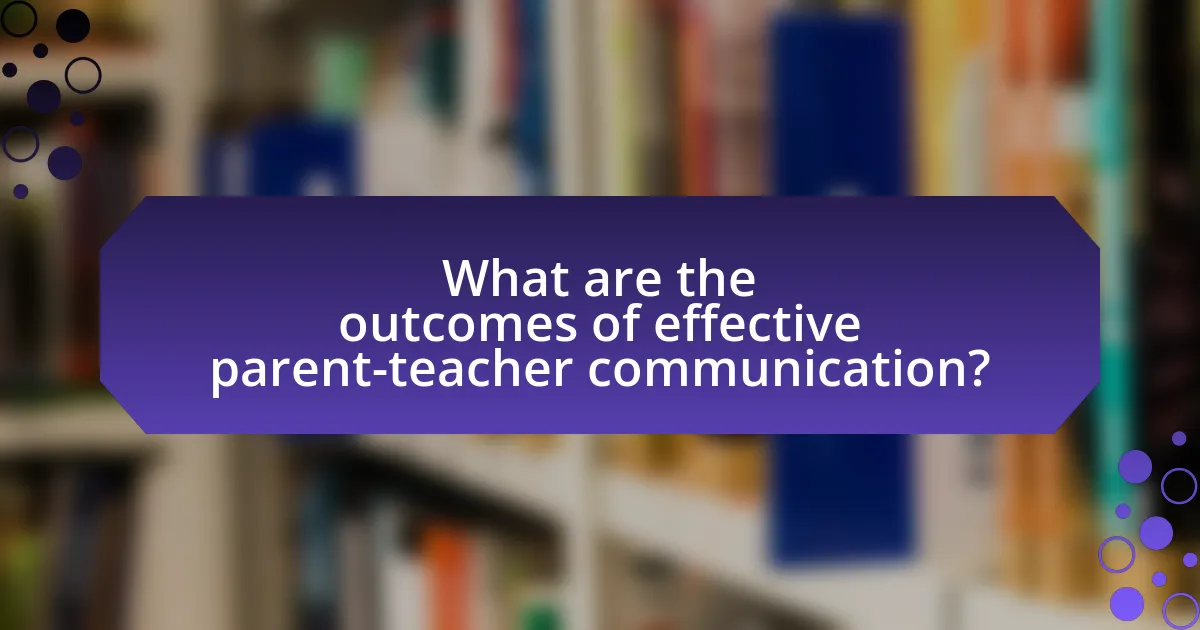
What are the outcomes of effective parent-teacher communication?
Effective parent-teacher communication leads to improved student academic performance and enhanced social-emotional development. Research indicates that when parents and teachers collaborate, students are more likely to achieve higher grades and demonstrate better behavior in school settings. A study by the Harvard Family Research Project found that students whose parents are actively involved in their education tend to have better attendance, higher test scores, and increased motivation. Furthermore, effective communication fosters a supportive learning environment, which contributes to students’ overall well-being and resilience.
How does effective communication impact student performance?
Effective communication significantly enhances student performance by fostering a supportive learning environment. When teachers and parents engage in clear, consistent dialogue, students receive reinforcement of academic expectations and emotional support. Research indicates that students whose parents are actively involved in their education tend to achieve higher grades and exhibit better behavior. For instance, a study published in the “Journal of Educational Psychology” by Hill and Tyson (2009) found that effective parent-teacher communication positively correlates with improved student outcomes, including higher test scores and increased motivation. This evidence underscores the critical role that effective communication plays in promoting student success.
What evidence supports the link between communication and academic success?
Effective communication significantly enhances academic success, as evidenced by numerous studies demonstrating that students with strong communication skills tend to perform better academically. For instance, a study published in the “Journal of Educational Psychology” by researchers at the University of California found that students who engaged in regular communication with teachers and parents had higher grades and improved test scores. Additionally, research from the National Education Association indicates that effective parent-teacher communication fosters a supportive learning environment, which correlates with increased student motivation and achievement. These findings collectively underscore the critical role of communication in facilitating academic success.
How can communication influence student behavior and engagement?
Communication significantly influences student behavior and engagement by fostering a supportive learning environment. Effective communication between teachers and students encourages active participation, enhances understanding, and builds trust. Research indicates that when teachers communicate expectations clearly and provide constructive feedback, students are more likely to exhibit positive behaviors and remain engaged in their learning process. For instance, a study published in the “Journal of Educational Psychology” found that students who received regular, positive communication from teachers demonstrated higher levels of motivation and academic achievement. This evidence underscores the critical role of communication in shaping student experiences and outcomes in educational settings.
What benefits do parents experience from effective communication with teachers?
Parents experience enhanced engagement in their child’s education through effective communication with teachers. This engagement leads to improved academic performance, as studies show that students whose parents are actively involved tend to achieve higher grades and test scores. Additionally, effective communication fosters a stronger parent-teacher relationship, which can result in better support for the child’s learning needs. Research indicates that when parents and teachers collaborate, it creates a more supportive learning environment, ultimately benefiting the child’s overall development and well-being.
How does communication enhance parents’ understanding of their child’s progress?
Communication enhances parents’ understanding of their child’s progress by providing timely and specific information about academic performance and social development. Regular updates from teachers through meetings, reports, and digital platforms allow parents to track their child’s strengths and areas needing improvement. Research indicates that effective communication leads to increased parental involvement, which correlates with better student outcomes; for instance, a study published in the “Journal of Educational Psychology” found that students whose parents were actively engaged in their education had higher grades and test scores. This direct exchange of information fosters a collaborative environment, enabling parents to support their child’s learning effectively.
What role does communication play in fostering a supportive home environment?
Communication is essential in fostering a supportive home environment as it facilitates understanding, trust, and emotional connection among family members. Effective communication allows parents to express their expectations and concerns, while children can share their feelings and experiences, leading to a more harmonious household. Research indicates that families who engage in open dialogue experience lower levels of conflict and higher levels of emotional well-being, as evidenced by a study published in the Journal of Family Psychology, which found that positive communication patterns significantly correlate with family satisfaction and cohesion.
What practical tips can enhance parent-teacher communication?
To enhance parent-teacher communication, establishing regular communication channels is essential. This can include scheduled meetings, phone calls, and digital platforms like email or messaging apps. Research indicates that consistent communication increases parental involvement, which positively impacts student achievement. For instance, a study published in the “Journal of Educational Psychology” found that students whose parents maintained regular contact with teachers had higher academic performance. Additionally, providing clear and concise information about student progress and school events fosters transparency and trust, further strengthening the relationship between parents and teachers.
How can teachers effectively prepare for parent-teacher conferences?
Teachers can effectively prepare for parent-teacher conferences by organizing student performance data and setting clear objectives for the meeting. This preparation involves reviewing academic records, behavioral notes, and any relevant assessments to provide a comprehensive overview of each student’s progress. Additionally, teachers should create an agenda that outlines key discussion points, ensuring that they address both strengths and areas for improvement. Research indicates that structured meetings lead to more productive conversations, as evidenced by a study published in the “Journal of Educational Psychology,” which found that well-prepared teachers foster better parent engagement and satisfaction.
What are some common pitfalls to avoid in parent-teacher communication?
Common pitfalls to avoid in parent-teacher communication include lack of clarity, emotional responses, and infrequent communication. Lack of clarity can lead to misunderstandings about student progress or expectations, which can be mitigated by using specific examples and clear language. Emotional responses, such as defensiveness or frustration, can hinder productive dialogue; maintaining a calm and professional demeanor is essential for effective communication. Infrequent communication can result in missed opportunities for collaboration; establishing regular check-ins or updates fosters a stronger partnership between parents and teachers.
